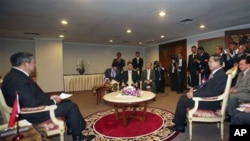An ancient temple on the border between Thailand and Cambodia is at the heart of a deadly dispute between the two countries. Clashes along the border this year have killed some 30 people and sent tens of thousands of villagers fleeing. Both governments say the dispute is about who owns the land around the temple. Nationalism and domestic politics in both countries also play a key role in driving the conflict.
The border dispute dominated the agenda of this year’s summit of Southeast Asia nations, where efforts by host Indonesia failed to bridge major differences between the two sides.
When Thai Prime Minister Abhisit Vejjajiva and Cambodian Prime Minister Hun Sen met Sunday at the meeting of the Association of Southeast Asian Nations, they exchanged accusations over who is responsible for prolonging the conflict.
Thailand’s Prime Minister argues that Cambodia provoked the fighting by stationing troops in the disputed area. Since then, he says Cambodia has repeatedly tried to internationalize the dispute by involving outside groups such as ASEAN and the United Nations.
Thitinan Pongsudhirak is Director of the Institute of Security and International Studies at Bangkok’s Chulalongkorn University.
"ASEAN has tried to mediate. There was an agreement in February to send Indonesian peace observers to both Cambodia and Thailand and Thailand agreed to it. But, the domestic crisis in Thailand is such that the army has superseded the civilian Abhisit government by reneging. And, basically, the agreement has been abrogated by the Thai side," Pongsudhirak explained.
In Thailand, the border clashes have come as the government prepares for nationwide elections in early July, raising suspicions that the country’s divisive domestic politics are playing a role in the conflict.
The election is seen as a showdown between Thai elites backed by the military and an opposition party supported by former Prime Minister Thaksin Shinawatra, who had friendlier relations with Cambodia during his time in power.
The military ousted Thaksin in a 2006 coup that was backed by nationalist demonstrators known as the Yellow Shirts. His supporters were purged from the military and government and he went into self-imposed exile to avoid corruption charges.
Since then, the country’s politics have been bitterly divided and opinion polls indicate the July elections vote will be close.
William Case is a professor of Asian and International Studies at City University of Hong Kong. He says Thaksin’s opponents may be hoping the border crisis can rally the nation behind them or can be used as an excuse to postpone elections.
"There are certain forces which would include the military and the Yellow Shirt movement that maybe don't want those elections because of the results that they may well bring," he said.
In December a group of Yellow Shirts stirred up nationalists on both sides by going to the disputed area where they were arrested by Cambodian troops for spying.
Yellow Shirts have since protested outside government offices against Abhisit for being too soft on Cambodia.
Tensions were first raised along the border in 2008, when the United Nations declared an ancient Khmer Hindu temple located just inside Cambodia as a World Heritage site. At that time in Thailand, a government aligned with Thaksin supported Cambodia’s application.
Michael Montesano is a visiting research fellow on Thai history and regional affairs at the Institute of Southeast Asian Studies in Singapore. He says the former prime minister’s political opponents seized on the temple’s listing to politicize the border dispute.
"Since then obviously things have spun out of control and we have armed violence among the Thai and Cambodian forces along the Thai and Cambodian border, a prolonged series of incidents over several years, ASEAN's chronic inability to address this violence between member states, all emanating from what began as a domestic political stunt on the Thai side,” Montesano stated.
The border dispute also has a political dimension in Cambodia, where relations with Thailand and Vietnam play a major role in domestic politics.
Cambodian Prime Minister Hun Sen is a close friend of Thaksin and in 2009, appointed him an economic advisor, and refused to extradite him to Thailand.
Montesano says many Cambodians see Thailand as arrogant towards its small neighbor and Prime Minister Hun Sen scores easy political points for standing up to Bangkok.
But Montesano says the issue also gives the Cambodia government political cover in its own border dispute with Vietnam. Hun Sen’s opponents have accused him of being weak in negotiations with Hanoi.
"I'm in no position to know whether they're right. But, they're people who say that Hun Sun's playing up the situation on the Thai border is a way to distract the Cambodian people from his much softer stance vis a vis Vietnam relating to poorly demarcated borders." he said.
The Cambodia-Thailand border was demarcated over a century ago by the French colonial powers and Thailand, then known as the Kingdom of Siam.
The Thai side tacitly accepted a French-produced map but resentment later resurfaced over allegations that the map was unfair.
The main area of contention is land surrounding a 900-year-old temple called Preah Vihear in Cambodia and Phra Viharn in Thailand.
The International Court of Justice in 1962 ruled the temple was Cambodia’s, which Thailand accepted, and the issue lay dormant for decades.
Thailand claims the land surrounding the temple, which the court did not rule on.
Earlier this month Cambodia asked the ICJ to clarify the 1962 ruling to try to settle the dispute. Thailand says it wants to resolves the dispute through direct talks with Cambodia.




